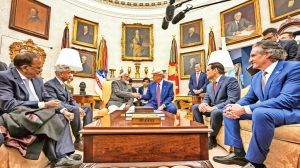‘Federalism should be evaluated based on its ability to foster democracy and ideals of equality, liberty’: CJI DY Chandrachud
CJI Chandrachud also said that "climate change, artificial intelligence and cybercrime transcend territorial boundaries which form the basis of federal units" and they "ill fit the conventional modes of union and state subjects."
 Loksatta inaugural lecture by CJI DY Chandrachud. (Express Photo by Amit Chakravarty)
Loksatta inaugural lecture by CJI DY Chandrachud. (Express Photo by Amit Chakravarty)Chief Justice of India D Y Chandrachud on Saturday said if federalism in the past years was about adjusting political realities, in the years to come, it should also be “evaluated based on its ability to foster democracy and constitutional ideals of equality, liberty, dignity and fraternity”.
CJI Chandrachud also said that “climate change, artificial intelligence and cybercrime transcend territorial boundaries which form the basis of federal units” and they “ill fit the conventional modes of union and state subjects”.
He was delivering the inaugural lecture in the Loksatta Annual Lecture series at Mumbai University Convocation Hall on Saturday evening on ‘Understanding federalism and its potential’.
“The unique nature of our polity has ensured that the predominant strength of the Union is counterbalanced by the plenary power of our states…If federalism in the years gone by was about adjusting to the political realities of the country in terms of legislative powers in the years to come federalism should also be evaluated based on its ability to foster democracy and constitutional ideals of equality, liberty, dignity and fraternity,” CJI Chandrachud said.]
The States and the Union, Chandrachud said, are both creatures of the Constitution. “They must act in synergy and cooperation in finding meaningful solutions to modern day problems. Our ability to address these challenges, in my view, is the litmus test for our model of federalism and the framers’ faith in it. I hope and wish that we eventually find these solutions in cooperation and mutual allegiance to our common constitutional goals of the federating units.”
Speaking on ‘future of federalism in India’, he added that the Constitution was “meant to be a transformative document and not a static one” and emphasised on new challenges.
He added, “Climate change, artificial intelligence, data privacy and cybercrime transcend territorial boundaries which form the basis of federal units. These new challenges ill fit the conventional modes of union and state subjects. Climate change is not just a concern for one of our coastal states. Every state in the nation bears the responsibility to answer the problems of climate change. We must remember the spatial impacts of these overarching problems. Some Indian states are much more severely impacted by the perils of climate change while some may be more prone to cyber attacks due to the greater volume or value of virtual transactions.”
He said that federalism was opposed by many in the West and was viewed as a principle that condoned discriminatory practices of the states.
“On the other hand, in the Indian context, critical engagement with the idea of federalism has been sparse. We almost unquestionably accept federalism as a good or desirable value in our political system. That is because the Indian Constitution has a very strong social conception of equality and liberty; thus conferring independent legislative and executive power to the states was never viewed as an avenue of enabling or permitting socially undesirable outcomes,” he said.
CJI Chandrachud added, “So it’s important for us to realise that distinct concept of federalism in India. When the Constitution was adopted as a socially transformative document, it gave to us a constitution where fundamental human rights would be recognized. And therefore, federalism was never regarded as a mask.”
Speaking on dialogues between the Central and state governments, he said, “The dialogues between the Union and the States must be placed on two ends of the spectrum. Collaborative discussions that cooperative federalism fosters are at the end of one spectrum and interstitial contestations are at the other hand. Both forms of dialogue are equally important for federalism to flourish. Federalism does not therefore entail only convenient outcomes but is equally welcoming of some contest.”
CJI Chandrachud added that constitutional courts, including High Courts and Supreme Court, “shape the federal system through interpretation of distribution of powers and other manifestations of federalism”.
He added, “A discussion on Indian federalism cannot possibly conclude without discussing the Courts’ contributions in developing this principle. The courts have been at the forefront of this development, bringing out the nuances of the doctrine to protect the interests of the States in terms of identity and efficiency.”
“The court has, in the last few decades, evolved a robust jurisprudential framework on federalism to ensure that the State rights are protected, the identity of various communities are fostered and values of representation are promoted,” CJI Chandrachud said.












